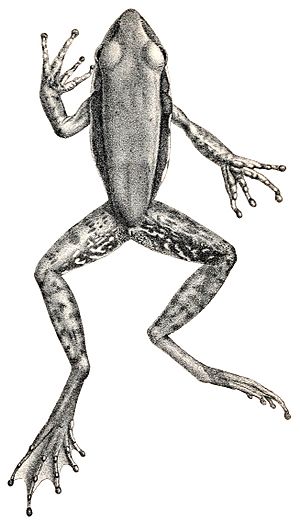Papurana kreffti facts for kids
The San Cristoval frog or San Cristobal treefrog (Papurana kreffti) is a type of frog found in Papua New Guinea. Scientists have also spotted this frog on the Solomon Islands and New Ireland Island.
Quick facts for kids Papurana kreffti |
|
|---|---|
 |
|
| Conservation status | |
| Scientific classification |
|
| Kingdom: | Animalia |
| Phylum: | Chordata |
| Class: | Amphibia |
| Order: | Anura |
| Family: | Ranidae |
| Genus: | Papurana |
| Species: |
P. celebensis
|
| Binomial name | |
| Papuarana celebensis (Boulenger, 1882)
|
|
| Script error: The function "autoWithCaption" does not exist. | |
| Synonyms | |
|
|
Script error: No such module "Check for conflicting parameters".
Contents
About the San Cristoval Frog
The San Cristoval frog is a fascinating amphibian. It belongs to a group of frogs often called "true frogs." These frogs are known for their smooth skin and strong legs, which help them jump far.
Where They Live
These frogs live in tropical areas. They prefer places with lots of moisture. This includes rainforests and other wet environments. They are often found near streams or ponds.
What They Look Like
Like many frogs, the San Cristoval frog has colors that help it blend in. This is called camouflage. Their skin might be shades of brown or green. This helps them hide from predators. They have large eyes, which are good for seeing at night.
What They Eat
San Cristoval frogs are carnivores. This means they eat other animals. Their diet mainly consists of small insects. They use their long, sticky tongues to catch prey. They might eat flies, beetles, or other tiny creatures.
Life Cycle and Reproduction
Frogs have an interesting life cycle. It starts with eggs laid in water. These eggs hatch into tadpoles. Tadpoles live in water and breathe with gills. They look like small fish.
As tadpoles grow, they change. This process is called metamorphosis. They develop legs and their gills disappear. They start to breathe with lungs. Eventually, they become adult frogs. Adult frogs can live on land and in water.
Female San Cristoval frogs lay their eggs in water. The male frog then fertilizes them. The eggs are usually laid in clumps. This helps protect them.
Conservation Status
The San Cristoval frog is currently listed as "Least Concern" by the IUCN Red List. This means that its population is stable. It is not currently facing a high risk of extinction. However, it's always important to protect frog habitats. This helps ensure their future.
See also
 In Spanish: Papurana kreffti para niños
In Spanish: Papurana kreffti para niños
 | Claudette Colvin |
 | Myrlie Evers-Williams |
 | Alberta Odell Jones |


